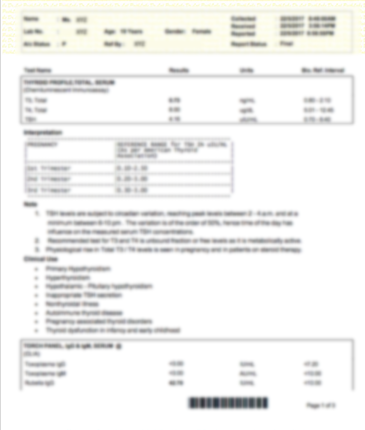FISH, Prenatal Aneuploidy Detection-CVS (5 Probes- Trisomy 21, 18, 13; X, Y) - C1188
Rs 2800
- Why Get Tested?
To help diagnose and monitor treatment for a carcinoid tumor that produces serotonin - When To Get Tested?
When you have symptoms suggestive of a carcinoid tumor, such as flushing, diarrhea, and/or wheezing; at intervals following treatment - Sample Type:Urine
- Fasting :NO
- Report Delivery:3rd Day
- Components:1 Observations
- Also Known As:
HIAA Serotonin Metabolite - Formal Name:
5-hydroxyindoleacetic Acid - Sample Instructions:
A 24-hour urine sample; rarely, a random urine sample - Test Preparation Needed?
You may be instructed to avoid certain foods and medications prior to this test. - What Is Being Tested?
5-hydroxyindoleacetic acid (5-HIAA) is the primary metabolite of serotonin, a chemical substance (neurotransmitter) that transmits messages between nerve cells. This test measures the amount of 5-HIAA in the urine. Serotonin is produced as needed by the nervous system, mainly the brain, but also special cells in the bronchial tubes (lungs) and gastrointestinal (GI) tract. It helps transmit nerve impulses and constrict blood vessels, participates in the wake-sleep cycle, and affects mood. After it is used by the body, serotonin is broken down in the liver, and its metabolites, including 5-HIAA, are excreted in the urine. Ordinarily, only small varying amounts of 5-HIAA are present in the urine. Large quantities of serotonin and 5-HIAA may be produced, however, by some carcinoid tumors. Carcinoid tumors are slow-growing noncancerous or cancerous neuroendocrine masses that can form in the GI tract, especially in the appendix, and in the lungs. About 2 out of every 3 carcinoid tumors are found in the GI tract with most of the rest occurring in the lungs, although they may affect other organs as well. According to the American Cancer Society, there are about 8,000 neuroendocrine tumors or cancers that start in the GI tract and 4,000 that start in the lungs diagnosed each year in the United States. Many more of these tumors may exist, but most remain small and do not cause any symptoms. When carcinoid tumors are discovered in asymptomatic patients during surgical procedures performed for other reasons, they are called "incidental" tumors. A small percentage of these tumors may eventually grow large enough to cause obstructions in the intestines or bronchial tubes of the lungs. About 10% of carcinoid tumors, primarily those found in the GI tract with liver involvement, will produce enough serotonin to cause symptoms, such as flushing of the face, diarrhea, a rapid heart rate, and wheezing, which are referred to as carcinoid syndrome. The serotonin that causes carcinoid - How Is It Used?
The 5-hydroxyindoleacetic acid (5-HIAA) urine test is used to help diagnose and monitor carcinoid tumors. It may be ordered by itself or along with a blood serotonin and/or chromogranin A level. 5-HIAA is the primary metabolite of serotonin that is excreted in the urine. Concentrations of 5-HIAA may be significantly increased when a person has a carcinoid tumor that produces serotonin. A 24-hour urine sample is preferred for the 5-HIAA test because the level of the metabolite can vary during the day. A random urine sample is sometimes tested, usually along with a urine creatinine level, when a 24-hour sample is not feasible. The random sample is not as accurate, however, and if excess 5-HIAA is released intermittently, then it may be missed. - When Is It Ordered
This test is primarily ordered when a person has symptoms suggestive of a carcinoid tumor. Examples of symptoms include: Flushing of the face and neck (appearance of deep red color, usually with sudden onset) Diarrhea, nausea, vomiting Rapid heart rate Wheezing, coughing, difficulty breathing This test may also be ordered at intervals to help monitor the effectiveness of treatment in people who have been diagnosed with and treated for a serotonin-secreting carcinoid tumor. - What Does The Test Result Mean?
A significantly increased level of 5-HIAA in a 24-hour urine sample in a person with carcinoid syndrome symptoms is suggestive but not diagnostic of a carcinoid tumor. In order to diagnose the condition, the tumor itself must be located and a sample of it examined (biopsy). The health practitioner will frequently follow an abnormal test result with an order for an imaging scan to help locate any tumor(s) that may be present. Someone with symptoms may still have a carcinoid tumor even if the concentration of 5-HIAA is normal. The person may have a tumor that does not secrete serotonin or one that secretes it intermittently. A person with no symptoms and normal levels of 5-HIAA is unlikely to have a serotonin-secreting carcinoid tumor. In those who are being monitored following treatment for carcinoid tumor, decreasing levels of 5-HIAA indicate a response to treatment, while increasing or continued excessive concentrations indicate that the treatment has not been successful. - Is There Anything Else I Should Known?
There are a variety of drugs that can affect the 5-HIAA test. Medications that can increase 5-HIAA include acetaminophen, caffeine, ephedrine, diazepam (Valium), nicotine, glyceryl guaiacolate (an ingredient found in some cough medicines), and phenobarbital. Medications that can decrease 5-HIAA include aspirin, ethyl alcohol, imipramine, levodopa, MAO inhibitors, heparin, isoniazid, methyldopa, and tricyclic antidepressants. People should talk to their healthcare provider before decreasing or discontinuing any medications.
Frequently Booked Test
Absolute Eosinophil Count
-
C1214
-
5-a-Dihydrotestosterone (5a DHT)
-
within 72 Hrs of Test Schdule
₹ 350.00
Absolute Eosinophil Count
-
C1214
-
5-a-Dihydrotestosterone (5a DHT)
-
within 72 Hrs of Test Schdule
₹ 350.00
Absolute Eosinophil Count
-
C1214
-
5-a-Dihydrotestosterone (5a DHT)
-
within 72 Hrs of Test Schdule
₹ 350.00
